
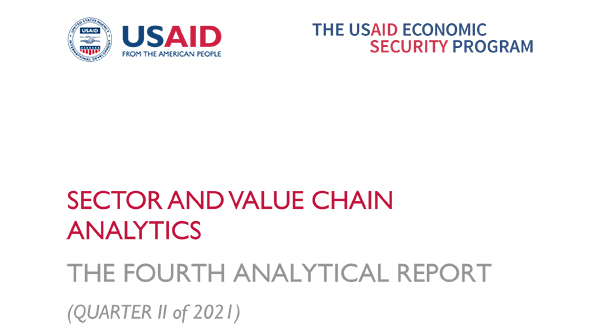
This quarterly report provides an analysis of economic trends, as well as denoting the challenges and opportunities (in local, regional, and global contexts) across selected value chains within six sectors to improve evidence-based decision-making through the provision of quality information and analytics. The specific sectors are tourism, creative industries, light manufacturing, shared intellectual services, waste management and recycling, along with cross-cutting sectors. The analysis tracks trends from the second quarter of 2021.
Please find the full publication in English and the executive summary of the report in Georgian.
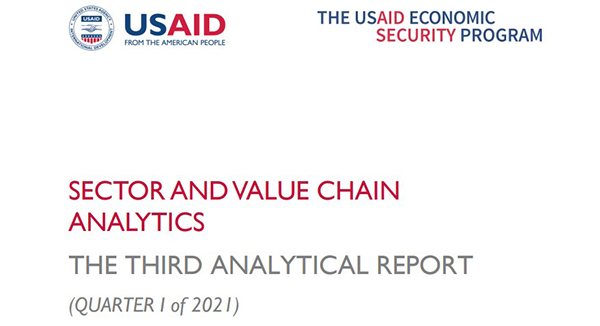
This quarterly report provides an analysis of economic trends, as well as denoting the challenges and opportunities (in local, regional, and global contexts) across selected value chains within six sectors to improve evidence-based decision-making through the provision of quality information and analytics. The specific sectors are tourism, creative industries, light manufacturing, shared intellectual services, waste management and recycling, along with cross-cutting sectors. The analysis tracks trends from the first quarter of 2021.
Please find the full publication in English and the executive summary of the report in Georgian.
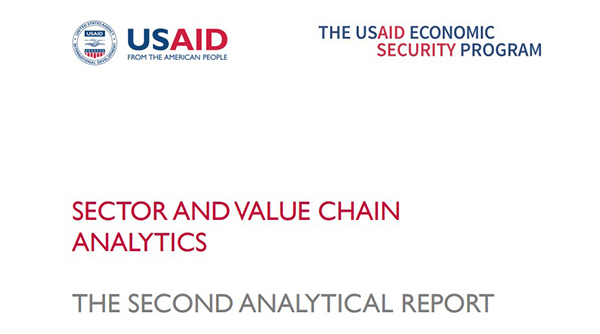
This quarterly report provides an analysis of economic trends, as well as denoting the challenges and opportunities (in local, regional, and global contexts) in the selected value chains within six sectors to improve evidence-based decision-making by providing quality information and analytics. These specific sectors are tourism, creative industries, light manufacturing, shared intellectual services, waste management, and recycling, along with cross-cutting sectors. The analysis tracks trends from 2016 to December 31, 2020.
Please find the full publication in English and the executive summary of the report in Georgian.
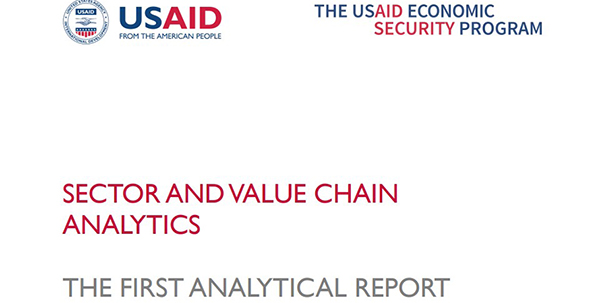
This quarterly report provides an analysis of economic trends, as well as denoting the challenges and opportunities (in local, regional, and global contexts) in the selected value chains within six sectors to improve evidence-based decision-making by providing quality information and analytics. These specific sectors are tourism, creative industries, light manufacturing, shared intellectual services, waste management and recycling, along with cross-cutting sectors. The analysis tracks trends from 2014 to the third quarter of 2020. The following is a synopsis of the findings for this quarter: Tourism (accommodation, catering, adventure tourism, gastronomic tourism, and cultural tourism); Creative industries (media content production and post-production, and artisan); Light manufacturing (furniture, packaging, construction materials, personal and protective equipment (PPE), and wooden toys); and Solid waste management and recycling.
Please find the full publication in English and the executive summary of the report in Georgian.
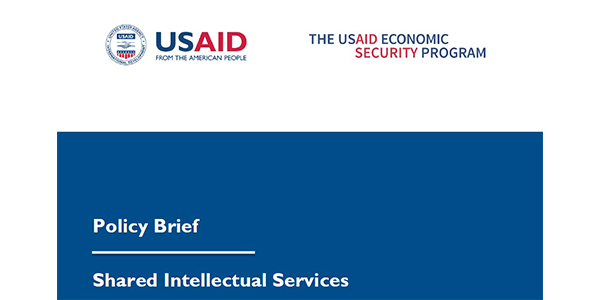
This policy brief on the shared intellectual services sector in Georgia has been developed by Policy and Management Consulting Group (PMCG) under the USAID Economic Security Program. Its aims are to identify the key economic policy challenges in Georgia existing in this sector, and to facilitate dialogue between private and public sectors including a wide spectrum of civil society and political representatives.

Artificial Intelligence (AI) is increasingly becoming a part of our everyday lives. The use of Unmanned Aerial Vehicles (UAVs) was observed in the Nagorno-Karabakh conflict; AI model was developed to diagnose COVID-19. The leader of the Georgian Dream criticized opponents for using deepfake programs to misinform the electorate during the 2020 parliamentary election campaign. AI offers tremendous benefits for our societies, in terms of public governance, business development and healthcare, but it also raises important economic, legal and ethical questions.
Governments aiming to develop effective AI policies face a twofold challenge. On the one hand, they have to create an AI friendly eco-system, attract AI investors, boost the development of AI technologies, increase the industrial application of AI and therefore, improve overall, AI-generated economic and social welfare. On the other hand, governments should create policy frameworks to balance AI associated risks, which might be related to personal data protection, targeting, algorithmic discrimination, cybersecurity, and/or AI liability.
AI technologies are expected to add US$15 trillion value to the global economy by 2030. According to PricewaterhouseCoopers (PwC) research, global GDP could be up to 14% higher in 2030, as a result of AI. Several countries developed national AI strategies during the last couple of years. EU recently announced ambitious AI goals to compete with the US and China and issued several AI policy documents. Some of the EU member states (MSs) also made significant progress, in terms of national or sector-specific AI policies. US & China are world leaders in terms of AI technologies, but countries like Canada, Japan and Singapore also allocated solid resources for AI policy and research development. Leading international organizations like the World Economic Forum (WEF) and the Organization for Economic Development (OECD) established AI policy programs.
AI positioning of the developing and the developed countries differ greatly; AI could even widen the gap between the rich and the poor nations, by shifting more investments into developing countries and replacing the labour force of the developed nations. Georgia’s AI positioning in the world is modest. According to the AI Readiness Index, the country was ranked #72 out of 172 countries and #5 in the region, below Turkey, Ukraine, Belarus and Azerbaijan. Interestingly, out of 10 ranking dimensions, Georgia received the highest score in Data Representativeness (70.91) and the lowest in AI Vision (0). Georgia is a country of limited human, economic and technological resources. Considering the current AI state of play in the country and especially the issue with the “vision”, it is important to take radical and effective steps to improve global and regional AI competitiveness and ensure that Georgia is not left behind by the “AI revolution”.
Following the international experience, the first step for Georgia to tackle the AI-related challenges and opportunities could be the development of a comprehensive AI strategy. The research aims to investigate the potential of developing a national AI strategy in Georgia, which could potentially create an opportunity for further sector-specific AI policy developments/research. Strategy document could serve as the foundation for AI ethics and policy development in the country.
Working on a national AI strategy requires the involvement of a wide group of actors, including government representatives, business companies/associations, international experts, representatives of academic/research institutions and the public.
AI technologies are broadly applied in several sectors, from military to education, that is why it is significant for the strategy document to be comprehensive and cover important areas of governance and economy. Having a clear strategy could help to coordinate several governmental policies and ensure that there is no contradiction between the AI strategic goals and certain sectoral goals. Therefore, the strategy preparation process has to be transparent and inclusive, to ensure the high legitimacy of the document. The international aspect of the AI policy is also significant, both in terms of potential risks and business opportunities.
The research would be based on a qualitative policy research method, combining the secondary research and interviews with the relevant industry experts. The quantitative method would also be used in certain cases. The research data will include official governmental documents (regulations, policy and strategy documents, decisions and the statements of the government officials) and academic literature related to legal, technical, economic and ethical aspects of AI. The scope of the research would be limited to the AI policy issues in Georgia, the EU, MSs. The examples from two neighboring countries of Georgia – Turkey and Russia would also be used.
The second chapter of the paper focuses on the definition, historical development, application and importance of AI. The third chapter describes recent AI policy developments in different countries and identifies the main characteristics of these policies. The fourth chapter maps AI in Georgia and explores the current state of play of AI in the country with regards to the policy/regulation, business and education sectors. Based on the findings of the previous chapters and considering the experience of foreign countries, the fifth chapter provides recommendations for governmental, business and education sectors. The findings of the research are concluded in the final chapter.

This paper concentrates on the production and post-production (of audiovisual content) value chains within the creative industries sector and aims to facilitate dialogue between private and public sectors on the most critical policy/regulatory challenges. The paper is developed by PMCG under the USAID Economic Security Program.
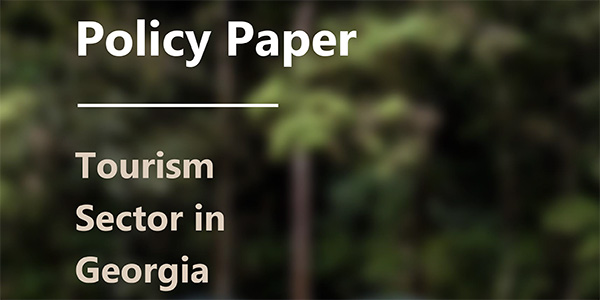
The aim of this document is to identify the key economic policy/regulatory challenges in Georgia’s tourism value chain and to facilitate dialogue between private and public sectors including a wide spectrum of civil society and political representatives. The paper is developed by PMCG under the USAID Economic Security Program.
- Periodic Issues
- ECONOMIC OUTLOOK AND INDICATORS IN GEORGIA
- HOTEL PRICE INDEX
- PMC RESEARCH - IFO GEORGIAN ECONOMIC CLIMATE
- BLACK SEA BULLETIN
- QUARTERLY TOURISM UPDATE
- ECONOMIC OUTLOOK AND INDICATORS IN UKRAINE
- SECTOR SNAPSHOTS
- EMPLOYMENT TRACKER
- MACRO OVERVIEW
- BAG Index
- Profile Of Bilateral Relations

